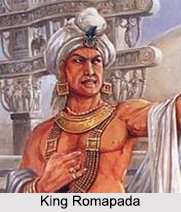 Romapada, also known as "Lomapada" was the Emperor of Anga. He was the youngest son of King Vidarbha of Yadava and an adopted son of King Dharmaratha of Anga. When King Dharmaratha grew old, He decided to make Romapada as the ruler of Anga. He is known in the Hindu mythology for his connection with Rishyasringa.
Romapada, also known as "Lomapada" was the Emperor of Anga. He was the youngest son of King Vidarbha of Yadava and an adopted son of King Dharmaratha of Anga. When King Dharmaratha grew old, He decided to make Romapada as the ruler of Anga. He is known in the Hindu mythology for his connection with Rishyasringa.
Legend of Romapada
There is a legend relating to the life of Romapada. The king, once, happened to upset some Brahmins or sages who lived in the palace to perform the rituals. The whole community of Brahmins was infuriated by the king"s behaviour and left the palace all together as a sign of protest. Romapada did not take this incidence seriously at that time.
In accordance with the Hindu believe, the nature has its own ways to punish the guilty and reward the worthy. Lord Indra was not pleased with the king, as he was not getting his share from the yajnas. He showed his annoyance by holding back rain in the whole state of Anga. Famine and draught attacked the state and this situation left the king troubled. He consulted his ministers. They suggested him that Lord Indra must be calm down as soon as possible. Some Brahmins are needed to perform the Yajna rituals. No other people in the country were there as capable and religious as of Rishyasringa. However it was not very easy to get the young sage as his father, Vibhandaka would never let him out his hermitage.
Romapada or Lomapada heard various suggestions on getting the young Rishyasringa to the palace. The young sage was innocent of the ways of the world as was detached from the worldly life. The king offered rich rewards for those who accomplished the task that is to get him from the clutches of his father. Many were tempted to try, but, did not dare to provoke the old sage, Vibhandaka.
There was an old courtesan in the palace and she was willing to try. There was a stream that flowed through the Anga territory and passed by the hermitage of Vibhandaka. The old courtesan set forth to the forest in a boat with a team of her young apprentices and made a secret camp near the hermitage. Within a couple of days the young ladies took note of the movements of the elder sage. He, normally, completed his morning rituals and then went out in search of food and materials for the next day"s sacrificial rites. Their plot somehow was successful to convince Rishyasringa.
Rishyasringa used his supernatural powers and brings rain. The kingdom receives bountiful rains. Romapada made his ultimate move to pacify the old sage, Vibhandaka. He brought his daughter, Shanta to Vibhandaka and offered her as wife to young Rishyasringa. Vibhandaka was very pleased with the gesture and found the young princess a suitable bride for his son.




















